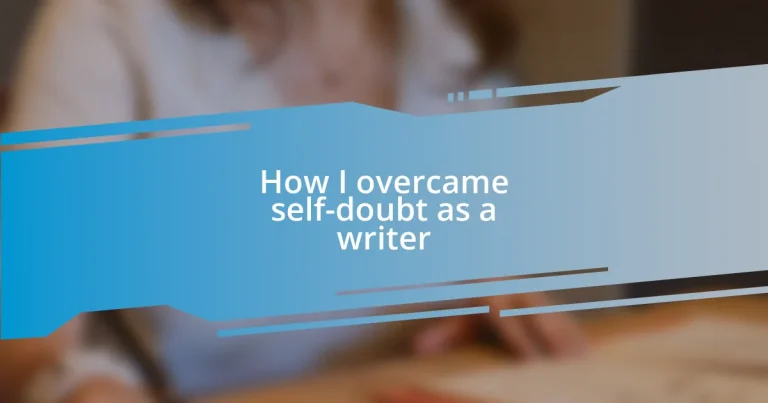Key takeaways:
- Self-doubt is a common experience for writers, often stemming from comparison and unrealistic expectations; shifting perspective can turn it into a catalyst for growth.
- Building a supportive writing community and practicing positive self-talk can help combat self-doubt and foster a nurturing environment for creativity.
- Setting realistic writing goals and celebrating small victories can enhance confidence and motivation, transforming the writing process into a more fulfilling journey.
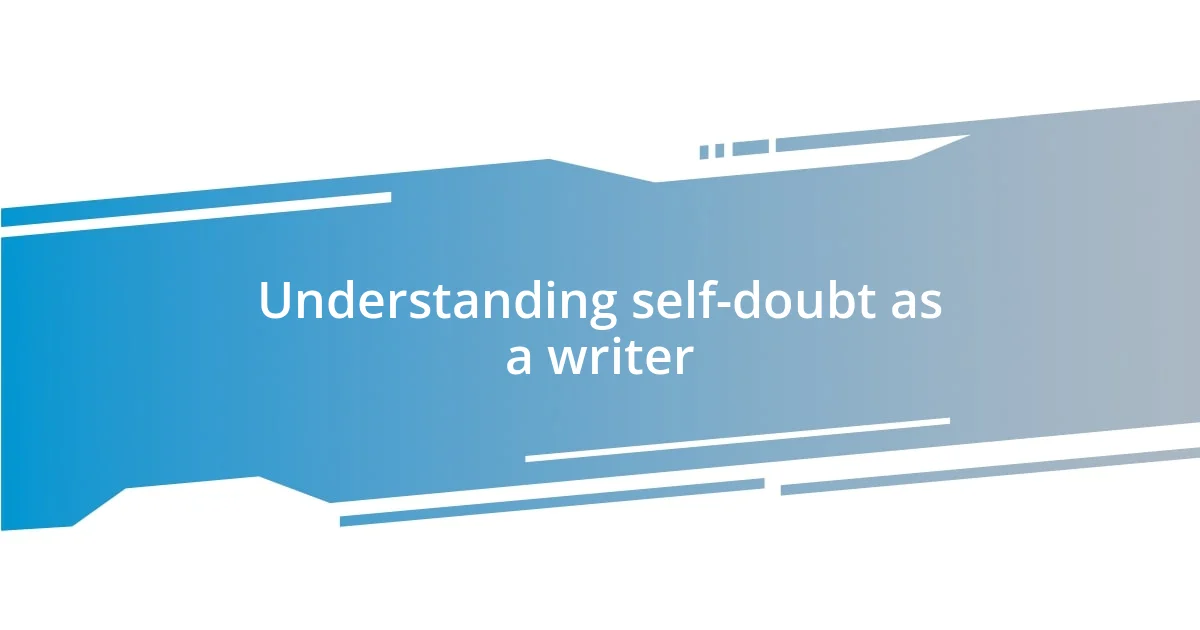
Understanding self-doubt as a writer
Self-doubt often creeps into my writing, whispering questions that make me second-guess every word and idea. I remember a time when I stared at a blank screen, paralyzed by fear: “What if no one likes this?” That moment was like standing on the edge of a cliff, weighing the leap into creativity against the safety of silence.
As I reflect on my journey, I realize self-doubt is almost a rite of passage for writers. It’s that nagging feeling that we’re not enough or don’t belong in the literary space. There were countless nights when I’d read other authors’ work, convinced I’d never measure up. But then, I asked myself: “What is it about their work that resonates with me?” This shift in perspective turned self-doubt into a catalyst for growth rather than a barrier.
Digging deeper, I’ve come to understand that self-doubt often stems from comparison and unrealistic expectations. For instance, I used to believe that every piece of writing must be perfect on the first try, which was an impossible standard to meet. Recognizing that vulnerability and imperfection are part of being human helped me embrace the process of writing—and made the journey feel less isolating. How has self-doubt shaped your writing experience?
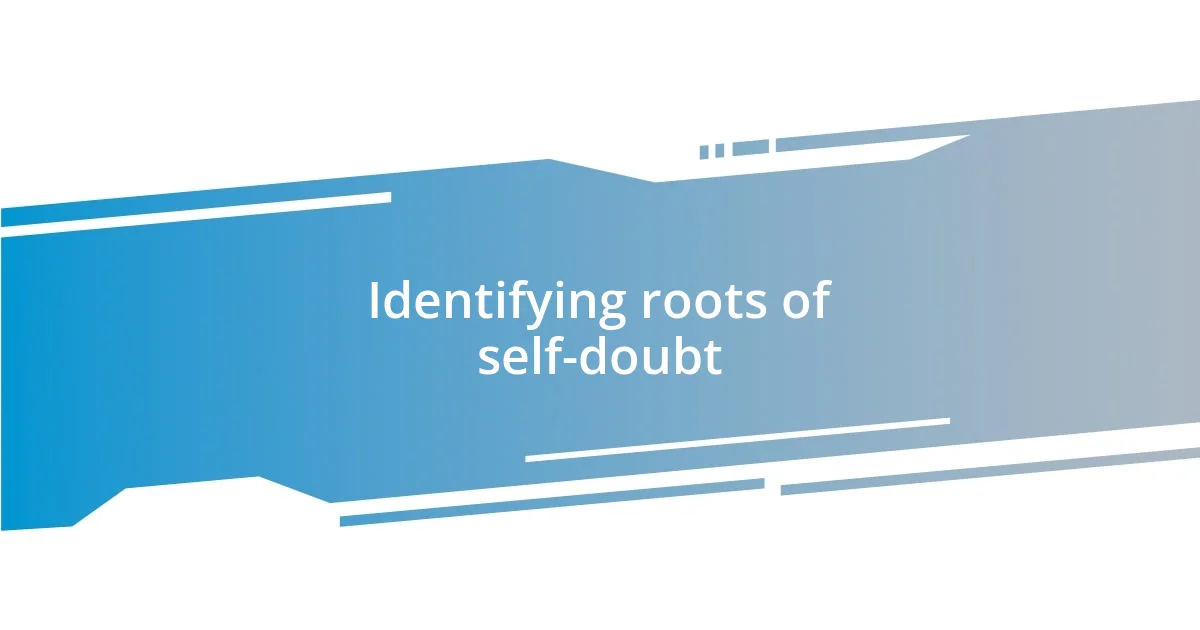
Identifying roots of self-doubt
Identifying the roots of self-doubt can be a revealing process. I’ve found that many times, these feelings arise from early experiences—like a teacher’s critical comment that lingers long after the classroom has emptied. In my case, a dismissive remark from a peer made me question my abilities for years. Reflecting on those moments helped me realize that external validation was not what mattered; it was my own belief in my voice that needed to grow.
Sometimes, I noticed that self-doubt was highlighted in situations where I compared my work to published authors I admired. I remember one incident where I had just finished an article and then read something by a well-known writer. Instead of celebrating my progress, I felt deflated, thinking I’d never reach that level. This taught me that most writers face similar insecurities, and acknowledging them can actually foster a sense of community rather than isolation.
Through exploration, I realized that societal pressures and personal expectations often ignite self-doubt. I recall agonizing over my blog’s engagement metrics, feeling like I wasn’t measuring up when statistics fell short. This was a wake-up call; I learned to focus more on the joy of writing rather than the numbers. Embracing my passion, rather than letting external factors define my worth, allowed me to shift from a scarcity mindset to one of abundance regarding creativity.
| Source of Self-Doubt | Impacts on Writing |
|---|---|
| Critical feedback from others | Internalized negativity, leading to hesitation |
| Comparison to successful writers | Feeling inadequate and discouraged |
| Societal expectations and metrics | Pressure to conform, diminishing creativity |

Building a supportive writing community
Building a supportive writing community has been a game-changer for me. At first, I navigated the writing world alone, feeling isolated and overwhelmed by my self-doubt. However, joining a local writers’ group felt like stepping into a warm embrace. Suddenly, I had a circle of encouraging peers who understood the struggles and triumphs of the writing journey. I vividly recall sharing a rough draft with my group; instead of the usual nerves, I felt anticipation. Their constructive feedback made me realize that vulnerability breeds connection, and sharing my work became an empowering experience.
To cultivate a supportive writing community, consider these steps:
- Join local or online writing groups: Engaging with others can help you find comfort and validation.
- Participate in writing workshops: These provide critical feedback while fostering camaraderie.
- Connect with fellow writers on social media: Platforms like Twitter and Instagram have vibrant writing communities.
- Attend literary events and open mic nights: These gatherings allow for networking and exposure to new ideas.
- Set up a critique partnership: Partnering with another writer can provide mutual support and accountability.
By creating these connections, not only do we uplift one another, but we also shatter the walls of self-doubt, making the writing process a shared adventure.
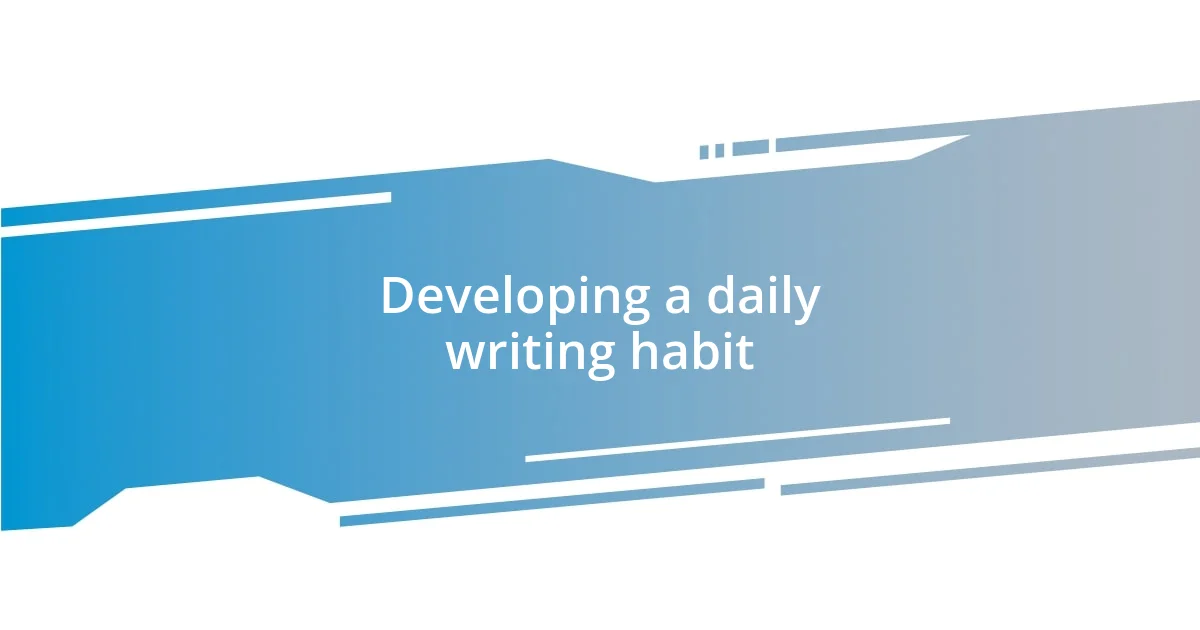
Developing a daily writing habit
Developing a daily writing habit transformed my approach to self-doubt. Initially, I struggled to write consistently, often feeling overwhelmed by my perfectionism. I vividly remember when I decided to set aside just ten minutes each morning to jot down my thoughts. This small commitment felt manageable, and surprisingly, it became a ritual that I began to look forward to. Have you ever found a routine that just clicks? For me, that gentle start didn’t just encourage my writing; it created a safe space to explore my ideas without the fear of judgment.
As I built this habit, I noticed something fascinating: the act of writing became less about the final product and more about the process itself. I started each session with zero expectations—sometimes I wrote complete drivel! But with time, those moments flowed into better stories and clearer thoughts. I ask myself, “What if today’s writing could be the spark for tomorrow’s masterpiece?” That kind of thinking helped quiet my inner critic. Each word on the page felt like a step forward, reinforcing my belief that my voice mattered.
Consistency has been a vital part of battling my self-doubt. I found that writing at the same time every day not only trained my brain but also made writing feel more like a commitment to myself rather than a chore. As the pages filled with my thoughts, I could visibly see my growth over weeks and months. It reminds me of this question: How can I doubt a writer who shows up daily? Each day, I became a little more confident, and that daily practice slowly chipped away at my self-doubt, proving to me that not every piece needs to be perfect—growing as a writer is the real victory.
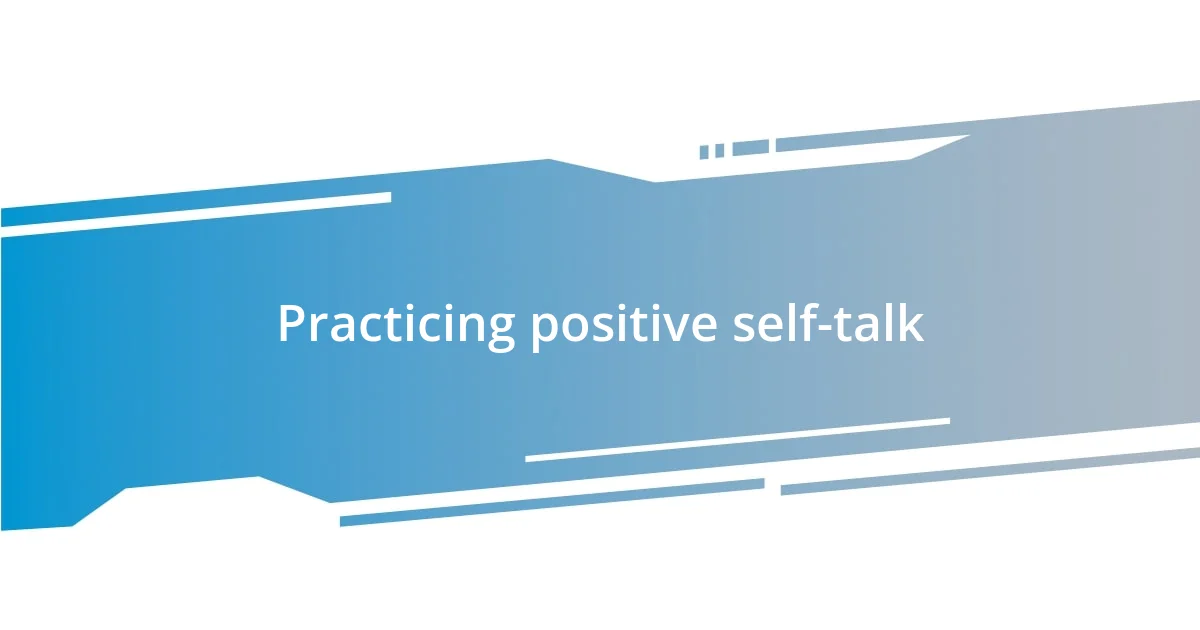
Practicing positive self-talk
Practicing positive self-talk has been a revolution in my writing journey. I remember a time when negative thoughts would flood in as soon as I opened my laptop. Phrases like, “Who do you think you are?” or “You’ll never be as good as them” haunted me. But one day, I decided to flip the script. I began to replace those harsh critiques with affirmations—simple statements like “I am a writer” and “My words matter.” Can you picture how powerful it felt to transform my internal dialogue? It’s like turning on a light switch; suddenly, I could see my potential rather than just my flaws.
As I immersed myself in this practice, I started to notice something interesting. Whenever self-doubt crept back in, I’d pause and remind myself of my achievements, however small. I recall celebrating every completed draft, no matter how messy, and feeling a rush of pride. I often ask myself, “What have I accomplished today?” This inquiry helps me anchor my thoughts in the positive, ensuring that even on tough days, I can find something to celebrate. It’s incredible how those moments of recognition can bolster your confidence and propel you forward.
By consistently reinforcing positive self-talk, I’ve created a nurturing atmosphere for my creativity. Whenever I face a block, I tell myself, “This is just a moment, not a pattern.” That simple statement has helped me pave the way for new ideas to emerge. It’s fascinating to consider how our minds react to the words we choose. Was it always easy? Not at all. But with each positive affirmation, I rewire my thinking, making room for growth in ways I never thought possible. So, what will you tell yourself the next time self-doubt rears its head?

Setting realistic writing goals
Setting realistic writing goals has been a game changer for me. I remember the early days when I aimed to write a novel in a month; it felt insurmountable. Instead of overwhelming myself with lofty targets, I began breaking down my aspirations into smaller, achievable chunks. For instance, I committed to writing just 500 words a day. This approach not only made my goals feel attainable but also allowed me to celebrate my progress, however modest.
As I gradually simplified my objectives, I found that my confidence began to boost significantly. Completing those smaller tasks gave me a sense of accomplishment that fueled my desire to write more. I often reflect, “How fulfilling is it to tick off a goal?” Each time I wrote a day’s worth of words, it grounded me and reminded me that every little bit counts in the larger picture. Plus, it took the pressure off; rather than fixating on perfection, I learned to embrace the journey of creation.
After a while, I realized that setting realistic goals wasn’t just about what I could achieve in terms of word count; it was also about fostering a positive mindset around my writing. Each goal became a stepping stone, leading me not just closer to my end result but encouraging me to explore my creativity in ways I had never anticipated. Isn’t it refreshing to think that progress, no matter how small, can pave the way for greater achievements? With each goal met, I felt my self-doubt diminish just a little more, replaced by a growing belief in my capabilities as a writer.

Celebrating small writing wins
Celebrating small writing wins has become a vital part of my journey. There was a time when I would overlook minor achievements, thinking they weren’t worth recognizing. But now, when I finish a particularly challenging paragraph or receive positive feedback on a single sentence, I allow myself to pause and appreciate the moment. Have you ever felt that rush of joy when something you’ve written resonates with someone? It’s those brief moments of triumph that remind us we’re on the right path.
I remember finishing a short story that had lingered in my drafts for months. While it wasn’t a bestseller, the sheer act of completing it and sharing it with friends felt monumental to me. I celebrated that night with a favorite meal and a promise to myself: each piece of writing, regardless of its scale or audience, holds value. How often do we forget to celebrate our progress? I learned that taking a moment to acknowledge these small victories doesn’t just boost my confidence; it becomes a spark that ignites my passion for writing again.
Each small win compounds over time, creating a tapestry of accomplishments that I can be proud of. I’ve started a routine where I journal my small victories at the end of the week, reflecting on what I’ve done. It’s a simple but powerful reminder of my growth. Have you tried this for yourself? I find that when I review these wins, they fuel my determination. It’s a beautiful cycle: the more I celebrate, the more motivated I feel to write, breaking the chokehold of self-doubt one small achievement at a time.












